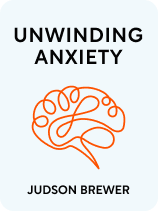

This article is an excerpt from the Shortform book guide to "Unwinding Anxiety" by Judson Brewer. Shortform has the world's best summaries and analyses of books you should be reading.
Like this article? Sign up for a free trial here.
What are the struggles of dealing with stress and anxiety? Why is it so hard to change anxious behavior?
According to Dr. Judson Brewer, many people struggle with getting rid of anxiety. He explains in his book Unwinding Anxiety that people are resistant to change because they believe anxiety has some benefits.
Let’s look at why anxiety isn’t beneficial and the obstacles you’ll face while coping with anxiety.
First, Is Anxiety Ever Beneficial?
To start with, Brewer points out that some people are uncomfortable with the idea of completely getting rid of anxiety, believing that a little anxiety is a necessary motivator. He dismisses this idea, arguing that the research it’s based on has been debunked and that many elite athletes and other performers appear totally relaxed when at their best. Knowing anxiety doesn’t have any necessary benefits should be a motivating factor in dealing with stress and anxiety.
Why We Resist Change
This desire to hold on to a little anxiety is part of what psychiatrist David Burns calls outcome resistance—his term for when therapy fails because on some level patients don’t want to change even though they think they want to (this is opposed to process resistance, where therapy fails because patients want to change but are unwilling to do the necessary work).
Burns argues that when beginning treatment (whether through formal therapy or self-help), you first need to weigh the pros and cons of the disorder you’re trying to change (in this case, anxiety). In particular, he suggests listing the positive side effects of anxiety and asking why you would want to let go of these.
The idea is that by honestly assessing what we’re getting out of anxiety, we can see that there are benefits—for instance, anxiety can keep you from taking risks, and some risks are harmful. But we can also see that these benefits are generally outweighed by the drawbacks they come with—for example, in extreme anxiety, you might perceive leaving your home or interacting with others as risks, which can severely limit your life. Plus, as we’ve seen, even if anxiety does motivate you to do work, by shutting down your brain, it makes your work less effective.
Burns believes that if you take the time to consider all of your motivations—including your motivations to stay the same, not just your motivations to change—you can avoid outcome resistance because you’ll have made a fully informed decision. Note that this recommendation fits well with Brewer’s suggestions to mindfully examine your behaviors. The same techniques you’d use to assess a behavior’s reward value can help you examine the pros and cons of your anxiety as a whole.
Roadblocks to Change
Even if you fully buy into the goal of eliminating and dealing with your stress and anxiety, you might run into additional roadblocks, such as overthinking and beating yourself up.
Overthinking
Brewer warns that it’s easy to overthink things when you’re trying to change anxiety. Overthinking can take several forms:
- Getting stuck in the conceptual stage—that is, mapping out habit loops without actually doing anything about them.
- Applying old knowledge and habits to try to change anxiety. As we’ve seen, a lot of habit change strategies don’t work on anxiety. Plus, as Brewer points out, there’s no sense in trying to change anxiety using the same behaviors and thought processes that created it in the first place.
- Viewing mindfulness as knowledge instead of a skill. You have to practice regularly to get any benefit.
- Trying to figure out why you’re anxious—which doesn’t actually matter. He says you don’t need to diagnose a root cause to fix the problem, and obsessing about why you’re this way or why you haven’t gotten better only makes the situation worse.
Beating Yourself Up
Finally, any kind of change comes with the danger that you’ll beat yourself up if things don’t go smoothly or you slip up. But as we’ve seen, harsh self-judgment is part of the anxiety loop, meaning that if you let it run free, you’ll only create more anxiety for yourself.
Plus, Brewer says that a negative attitude (frustration, pessimism, and so on) makes behavior change harder. If you tell yourself that changing your habits is impossible, you’re less likely to succeed. If you tell yourself that change is painful, you’re more likely to avoid doing the work (and more likely to revert to anxiety-related habits).
(Shortform note: Similarly, if you shame yourself for your anxious behaviors or for being anxious in the first place, you might not even try to change because you won’t believe it’s possible to do so. Likewise, as Brené Brown argues in The Gifts of Imperfection, shame can make you feel like you don’t deserve to do any better than you’re doing.)
To rewrite self-critical attitudes, Brewer recommends learning to see apparent failures—such as reverting to old, unwanted behavior—as learning opportunities. In other words, even when you make a mistake, as long as you respond with curiosity (rather than frustration, self-recrimination, or similar), you can still keep moving forward. Brewer says if you approach habit change with this learning mindset, you’re less likely to beat yourself up and more likely to stay positive even when things don’t go perfectly.

———End of Preview———
Like what you just read? Read the rest of the world's best book summary and analysis of Judson Brewer's "Unwinding Anxiety" at Shortform.
Here's what you'll find in our full Unwinding Anxiety summary:
- How to recognize and counteract anxiety with mindfulness
- Why anxiety becomes is toxic if left untreated
- A three-step method for treating anxiety






